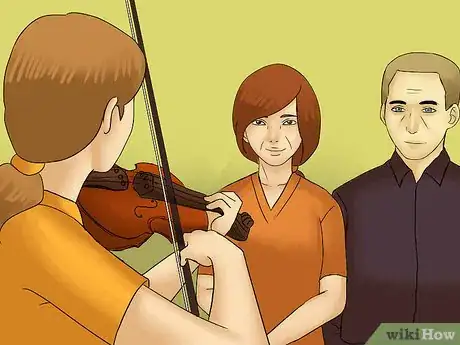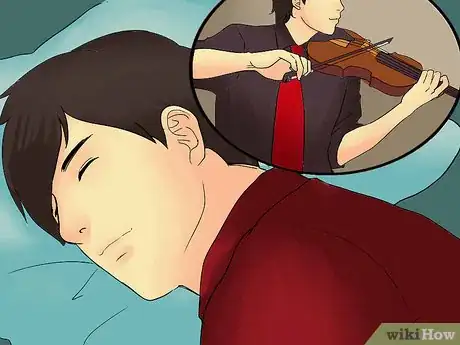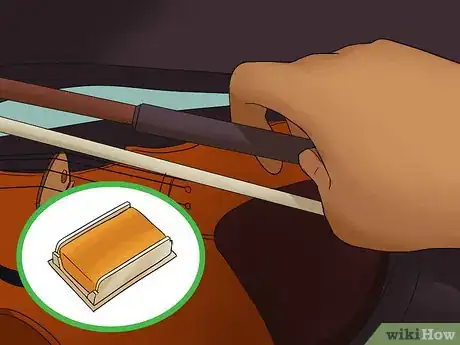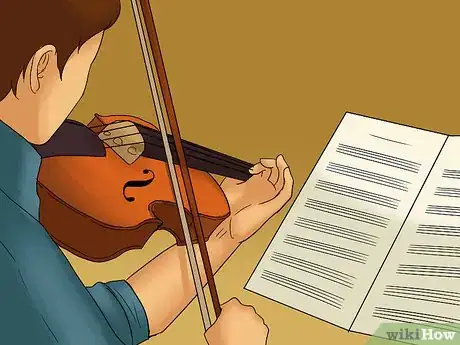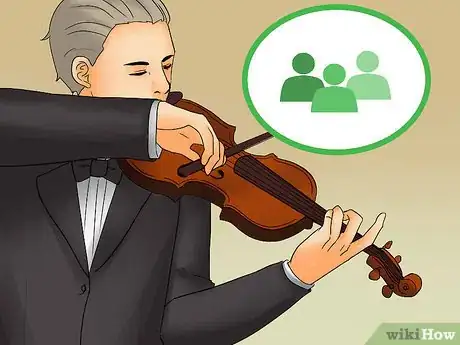This article was co-authored by Dalia Miguel. Dalia Miguel is a violinist and violin instructor based in the San Francisco Bay Area. She is studying Music Education and Violin Performance at San Jose State University and has been playing violin for over 15 years. Dalia teaches students of all ages and performs with a variety of symphonies and orchestras in the Bay Area.
There are 9 references cited in this article, which can be found at the bottom of the page.
This article has been viewed 33,269 times.
The first chair in an orchestra or band holds a lot of power: after the conductor, the rest of the ensemble looks to the first chair for clues on musicality and performance. Because of this, the position of first chair usually goes to an accomplished musician who is conscientious enough to keep the group on task. If you’re eager to push yourself musically, you’re probably interested in being first chair, but it’s not easy. Your best bet is to prepare by practicing a lot, being a reliable member of your ensemble, and honing your leadership style.[1]
Steps
Making Sure You're Ready for First Chair
-
1Ask yourself why you want it. Being first chair (or concertmaster) is gratifying, because it means that your orchestra director trusts you to lead and occasionally perform solos. However, all that leadership comes with big responsibilities. If music is a priority for you and you feel dedicated to the ensemble you play in, then you just might make a wonderful first chair. Ask yourself some of these questions so you’ll know how to approach your goal:
- Will you be able to attend all rehearsals?
- Do you have time to practice, so that you know your music well enough for others to follow you?
- Do you like helping others if they’re stuck?
- How will you support the orchestra if you don’t get first chair? This is important, because there can only be one first chair. If you don’t end up getting it, will you still be dedicated to the group?
-
2Learn the requirements. Some orchestras have tests for first chairs once every two weeks or so. Others have a constant first chair throughout the semester or even the year. Still others allow challengers to compete against the current first chair--each musician plays the same piece, and your teacher or director picks the best performance. Know how you have to try out so that you can prepare yourself.
- Check if your orchestra has age limits on who can be first chair. If only eighth-graders are allowed to be first chair and you’re a seventh-grader, spend the year practicing so you’ll perform incredibly next year.
- If your orchestra’s first-chair system relies on challenges, don’t challenge the current first chair too often. Challenges take up class time, so you don't want to do them frequently. Also, you might get a reputation as being difficult.
Advertisement -
3Be kind to your section mates. The best first chairs aren’t divas. Instead, they’re aware that they set an example for the rest of the ensemble, in performance and in rehearsal. If you want to be a good leader, you have to focus on other’s needs as well as your own.
- Be courteous to your fellow musicians. Be early for rehearsals, don’t hog sheet music or stands, and don’t trash-talk anyone else’s style.[2]
- Be available for help when others need it. If someone asks you for advice on their playing, it means that they trust you.
-
4Practice. There’s just no getting around it. It takes a lot of effort and dedication to become first chair. You need to make sure that you’re the best musician you can be, and the best way to get there is by practicing often and well.
- Set aside time every day.[3] If you go to school and have other extracurriculars, you probably feel really busy. Promise yourself that you’ll practice a certain amount of time every day, and arrange your schedule so that you can make that happen.[4]
- Practice in a consistent space. If you can, set up an area--maybe in your bedroom or living room--with a chair, music stand, and mirror (so you can check your posture). This will help you think of music practice as a normal part of your schedule.[5]
-
5Ask your parents if you can take private lessons. Many of the most dedicated musicians in your orchestra probably already work one-on-one with a teacher. In private lessons, you can improve your technique even more than you can with practice, because your teacher can point out strengths and weaknesses in your performance that you wouldn’t notice otherwise. This can be enough to give you an edge.
- What you say will depend on your history with your instrument and your relationship with your parents. Pick a quiet time, like when you're driving or doing the dishes together, and say "I've been thinking that I'd like to try private instruction so I can get better at violin. Is that something I could do?"
- If your parents can't get you private lessons, do your best to accept it. You can still improve a lot by practicing and attending orchestra.[6]
Feeling Confident in Your Audition
-
1Review the material and tryout process for first chair. Will you be playing a movement, or just a few phrases? Will you be performing for just your teacher or conductor, or the whole class? Make sure you’re prepared for the structure of the tryout, so you start with a confident, unruffled air about you.[7]
-
2Hold a mini-concert for your family. The night before the audition, gather your family together and play all your audition material exactly as you plan to the next day. This will help you know what it’s like to perform for an audience in a relatively low-pressure way. It will also check that you have all your material memorized (if necessary).[8]
- If you make a mistake, don’t say so. Keep going and do your best.
- If you have very snarky or giggly siblings, then you don’t have to play for them. Just your parent(s) or guardians will do.
-
3Visualize a good performance. Imagining yourself playing amazingly doesn’t replace practice, but it definitely helps. Before you go to sleep at night, close your eyes and imagine yourself playing confidently and well at your tryout. The day of your performance, your brain will be used to picturing what you need to do, so it will go more smoothly.[9]
-
4Be prepared the day of the testing. Whether it’s a challenge or audition, you want to do everything you can to set yourself up for success. Give yourself plenty of time the night before and the morning of your try-out, so you don’t feel rushed.
- Prep your instrument. Before you leave your house in the morning, remember to take your instrument with you. Make sure that it’s clean and that you have all the parts you need. Pack your instrument-specific supplies such as extra reeds or rosin if you need them.
- Get a good night’s sleep. You’ll perform your best if you’re alert.
- Eat a good breakfast. Some performers say that eating a banana helps them calm their nerves.[10] Really, the important thing is to eat food that makes you feel full and energetic.
- Wear something lucky (if you have it). You’ll be relying on your musicianship and preparation, of course, but your favorite t-shirt or necklace just might be the boost of confidence you need.[11]
-
5Relax. Before your try-out, make sure you’re taking deep, slow breaths to calm your body. If you’ve worked hard and practiced to get to where you are, you deserve to feel proud of yourself. Whatever the results of the tryout or challenge are, they’re second to your dedication to your instrument. You can’t do a yoga pose to de-stress yourself in the middle of your audition, but you think some happy thoughts:
- You’re a musician, so you belong in an orchestra, and you deserve to take a shot to be a student leader.[12]
- Your teacher or conductor is rooting for you and wants you to play well.
- You have set a goal for yourself, and that’s admirable.
-
6Be gracious no matter the outcome. Not to sound like a broken record, but an orchestra is a group of people who come together with the same goal: to make beautiful music. Every person there, including you, contributes to that. With that in mind, try to accept your director’s decision as gracefully as you can.
- If you don’t get first chair this time, it’s okay--you worked really hard, and you’re going to continue to improve. Congratulate the first chair, and then concentrate on making yourself and the group sound good.
- If you get first chair, try to look ahead to your new responsibilities: you have so much to do!
Being a Good First Chair
-
1Act like a leader. Now that you’re in the position of the concertmaster, it’s extra-important for you to model good practices for your fellow musicians. You’ve probably been on your best behavior for a while now, but it’s always good to refresh yourself. Do you have habits that are getting in the way, like tapping your toes to keep tempo? It’s time to address them.
- Always be early to rehearsals, so you’re fully prepared to start at the beginning. Your director probably already says “Early is on time, on time is late,” anyway.
- Stay alert. If you start daydreaming and lose your place, you won’t be able to lead your group as well as you could otherwise.
- If you notice anyone playing really beautifully, feel free to compliment them (after rehearsal). You’re all there to sound beautiful together.
-
2Practice as much as you can. Again, there’s simply no way to avoid it. Practicing will make your performances crisper and more artistic. Once you have your basic fingerings down, you will play more confidently at rehearsal. Practice so you can both play well and lead your section more effectively!
- Practice any solo parts. Principal players may get solos. Pay special attention to these parts during your practice.
- Listen to recordings of your pieces with your music in front of you. Know how your part fits in with the orchestra. Listen especially for rhythms, phrasing, and cues.[13]
-
3For string section leaders, make bowings for your pieces if not already given. Unless already done for you, it is your responsibility to chose bowings for your section. If you need help, watch the bowings of other orchestras, or talk to your private teacher or conductor.
-
4Ask for help if you need it. If you’re ever feeling stressed or stuck, the conductor of your ensemble is your best source of guidance. Whether you’re trying to get a particular phrase down perfectly or worried about conflict in the group, you don’t have to solve all the orchestra’s problems by yourself.[14]
- Be direct when you ask for help. Say something like "I'm having trouble getting the first few bars of the second movement right. Do you have any advice about how to make it sound more natural?"
-
5Focus on the group. At the end of the day, everything you do as first chair--even your amazing solo--is done with the goal of making the whole orchestra sound great. Focus on lifting up your stand mate, your section, and your whole group, blend, and be a supportive presence, and you’ll make beautiful music with your fellow musicians.[15]
Expert Q&A
-
QuestionHow often do I need to practice if I would like to improve my standing in the orchestra?
 Dalia MiguelDalia Miguel is a violinist and violin instructor based in the San Francisco Bay Area. She is studying Music Education and Violin Performance at San Jose State University and has been playing violin for over 15 years. Dalia teaches students of all ages and performs with a variety of symphonies and orchestras in the Bay Area.
Dalia MiguelDalia Miguel is a violinist and violin instructor based in the San Francisco Bay Area. She is studying Music Education and Violin Performance at San Jose State University and has been playing violin for over 15 years. Dalia teaches students of all ages and performs with a variety of symphonies and orchestras in the Bay Area.
Experienced Violin Instructor Try to practice about 2-3 hours a day. Instead of just playing through the music, make your practice sessions count by taking the hardest parts of the music and practicing them slowly.
Try to practice about 2-3 hours a day. Instead of just playing through the music, make your practice sessions count by taking the hardest parts of the music and practicing them slowly. -
QuestionHow do I steal somebody's chair in orchestra?
 Community AnswerBe the best. Practice, practice, practice. Also, go out of your way to be nice to the conductor so they like you.
Community AnswerBe the best. Practice, practice, practice. Also, go out of your way to be nice to the conductor so they like you. -
QuestionIf I am already first chair, how do I grow more in orchestra?
 ScratchspinCommunity AnswerWork on your leadership and musicianship. Practice dynamics, phrasing, tone, playing technique, etc. to make the music even better. Help others in your section, and learn from your conductor and other professionals in the orchestra.
ScratchspinCommunity AnswerWork on your leadership and musicianship. Practice dynamics, phrasing, tone, playing technique, etc. to make the music even better. Help others in your section, and learn from your conductor and other professionals in the orchestra.
Warnings
- Being first chair is a great goal, but don’t let it overshadow the joy you take in music.⧼thumbs_response⧽
- Don't challenge the existing first chair too often. It might make you seem combative.⧼thumbs_response⧽
References
- ↑ Dalia Miguel. Experienced Violin Instructor. Expert Interview. 27 August 2018.
- ↑ https://uosymphony.com/resources/orchestra-best-practices/
- ↑ Dalia Miguel. Experienced Violin Instructor. Expert Interview. 27 August 2018.
- ↑ http://www.npr.org/sections/deceptivecadence/2013/09/03/216906386/10-easy-ways-to-optimize-your-music-practice
- ↑ http://www.npr.org/sections/deceptivecadence/2013/09/03/216906386/10-easy-ways-to-optimize-your-music-practice
- ↑ Dalia Miguel. Experienced Violin Instructor. Expert Interview. 27 August 2018.
- ↑ http://stringsmagazine.com/12-ways-to-ace-your-orchestral-audition/
- ↑ http://www.npr.org/sections/deceptivecadence/2012/06/18/155283138/next-how-do-you-reduce-audition-anxiety
- ↑ http://www.bcu.ac.uk/acting/news/6-things-to-do-before-an-audition
- ↑ http://www.bcu.ac.uk/acting/news/6-things-to-do-before-an-audition
- ↑ http://www.livescience.com/8392-superstitions-bring-real-luck-study-reveals.html
- ↑ http://www.nycastings.com/10-steps-to-preparing-for-an-audition/
- ↑ Dalia Miguel. Experienced Violin Instructor. Expert Interview. 27 August 2018.
- ↑ http://tinybuddha.com/blog/how-to-ask-for-help-from-people-you-respect/
- ↑ https://uosymphony.com/resources/orchestra-best-practices/







